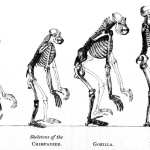The Transcendental Certitude of Metaphysical First Principles
by Dr. Dennis Bonnette
Filed under Belief, Philosophy

How do we really know that basic metaphysical principles, such as, that contradictions in being are impossible, are both certain and transcendentally true? That is, how do we have perfect certitude that they apply validly to every possible thing, including the God of classical theism?
Some have argued that the principle of non-contradiction (PNC), which states that the same thing cannot both be and not be in the same respect, applies merely to macroscopic reality – to the humans and horses and even bugs we see in the full size world of our normal experience. They claim, in the name of science, that at the submicroscopic level of subatomic entities, such as photons, the principle may be violated. For example, a photon presents experimentally both as a wave and as a particle, which seems to be contradictory.
The problem with this type of objection is that in order to make the observations that allegedly “prove” that a subatomic contradiction can be real, one must be certain that subatomic observations are what they are and are not otherwise. In other words, the observer must assume that the PNC is working at the subatomic level in order to judge, for example, that the photon is in truth behaving as a particle and not like a wave. It is bad logic to presuppose that the PNC is working at the subatomic level in order to “prove” that it does not work at the subatomic level!
What limits the extent of a principle’s application is the nature of that to which it applies. What applies to one kind of being may not apply to a different one. For example, a rule about chickens may apply to all possible chickens, but it may not apply to squid.
The PNC is a principle, not about any particular kind of being, but of being or existence itself. It does not matter what kind of being we consider, for example, whether macroscopic entities or submicroscopic ones. Once the mind understands what it means to exist, as opposed to not existing, it immediately and validly applies the PNC to anything and everything.
While it is possible for something to be a non-chicken, it is not possible for something to be a non-being. The PNC applies to both creature and God, not because they are like in nature – which they are not, but because both have being or existence. So, once we understand what it means to be, we know that the PNC applies both to creature and Creator and to every least existing aspect of every possible being. That is, it is transcendentally true.
The Problem with Some Logicians
Others object that the principle of non-contradiction is really merely a rule of logic, which says that the same predicate cannot be both affirmed and denied of the same subject. In this view, the rule may have universal conceptual validity within the mind, but what is to guarantee that it applies universally to extramental beings? How do we know that the PNC can apply validly to a transcendental entity, like the God of classical theism -- the reality of which would be utterly beyond the finite world in which we live?
The problem is that even such objectors, like the rest of us, find themselves unable to think of anything, except in terms of “being” or “non-being.” Even claiming that truth is merely a matter of probability still requires absolutely affirming the state of probability.
What makes the mind work this way? What makes skeptics keep trying to find contradictions in the God of classical theism, as if that would prove with certitude that such a being is impossible? They keep demanding that God obey the PNC in spite of being highly skeptical about its transcendental application to God.
We must recall that the concepts used in logic do not represent direct knowledge of things themselves, but merely abstract notions of things existing in the mind. What we first know, in fact, is not a concept, but real things in a real world – even if that real world is merely a really experienced bad dream. Even if someone is hallucinating pink elephants dancing on the ceiling, the hallucinations are still real as hallucinations. In knowing our own hallucinations, we, in fact, know something real in its own order.
It is objected by some that we simply do not encounter abstractions, such as “being” or “existence.” But, the concepts formed through abstraction, which are the ones logicians deal with, presuppose encounters with real things. You don’t form a concept of “animal,” unless you first have judged that you have encountered a real animal from which to abstract the universal form of animal.
The first knowledge we have of things is had in a judgment of existence, that is, that “something is real.” If I encounter a tiger, I judge that something is real and tiger-like in my experience. This judgment contains both the nature of the tiger and its reality or being, confusedly apprehended at first.
It is not the structure of my language that determines the content of my experience, but the reverse. That is, it is the content of my experience which has developed the structure of my language. First, we know things, and then we invent words to describe them. Even though my words reflect the structure of my experience, they do not determine it. Rather, as I reflect on what I perceive, I express language which I judge describes it correctly.
Unlike irrational animals, I not only have sense experience of some object, but I also am fully aware that I am judging that it actually exists before me. That is why it is correct to say that “I know something to be or exist,” not by sense knowledge alone, but by an intellectual judgment that this is true.
Rather than some presupposed theory forcing the description of experience, it is the experience itself as understood that forces the description of what is taking place. That is, first there is awareness of something there, second, self-reflective awareness of the awareness itself, and third, awareness of something (the self) having the awareness of something there.
Thus, the primary act of knowing things is a judgment of some kind of nature being real, that is, as existing. This is not to be confused with the concepts, empty of all existential content, which the logician studies in terms of their proper relationships. The logician’s concepts need not exist extramentally at all, once they are abstracted from really existing things or formed through a fictional combination of qualities taken from real things, as in the case of the unicorn.
That is, we first encounter some real being, even if it is merely a real mental experience, and only secondarily do we form the concepts of things that we use in logic.
We know full well that our judgment about whether something is really existing or not is not a mere judgment about relationships between concepts, but about real being itself.
This is why judgments about the nature of being itself do not fall under the purview of the science of logic, the practical science which determines correct relationships between concepts. The rule against contradictions in predication is simply an application to logic of the metaphysical principle of non-contradiction. Metaphysics regulates the science of logic, not vice versa.
That is why the Thomistic philosopher Jacques Maritain tells us that “…logic is the science of conceptual being and not a science of real being.”1
The Foundation of Certitude
Nor is there any doubt about the reality of being as encountered in lived experience. I often tell people just to try sitting on a large roofing nail. One might doubt whether the experience is (1) merely one of a subjective psychosomatic symptom or (2) one caused by an objectively real extramental nail. But one cannot doubt the reality of the pain involved!
That is because doubt is the fear of error, that is, the fear that something may not be the way we think it is. But, this means that there must be a real distinction between what one thinks to be real and some distinct objective reality. For example, if I think my car to be in my garage, but it actually has been removed by a thief. But, in the direct experience of the nail-induced pain itself, although I might doubt the reality of the nail, I cannot doubt the reality of the pain, because my experience of the pain is identical with the pain’s very reality – thereby allowing no possibility of a real distinction between my experience of the pain and the pain itself.
This is why we have perfect certitude that we encounter reality or being in our first experience of anything at all. For, in experiencing something, there can be no real distinction between the act of experiencing and its own real content, regardless of whether the experience is merely of some subjective fantasy or directly of some external object. The lack of a real distinction between the act of experiencing something and the reality of the experience’s own content precludes the lack of conformity required for the possibility of error and its associated doubt – at least as far as to the fact that something, some reality, some being has been encountered.
I can doubt whether the pink elephant I hallucinate dancing on the ceiling exists extramentally, but I cannot doubt that I am experiencing seeing one. Also, in that selfsame act of experiencing anything at all, we know immediately in a general way what the nature of being is, since being’s nature is given to us with certitude as our mind conforms to the real being of its own experienced content. We do not know a mere concept of being, but being itself in this direct experience of it – in the mental act in which we judge, “Something is, something is real, something is existing.”
This immediately-given understanding of being we express in judgments, such as, the principles of identity (that being is being) and non-contradiction (that being cannot be non-being). Our mind finds itself conformed to being itself in the selfsame act by which we first encounter being and in every subsequent such act. That is also why even skeptical logicians cannot help but think of all reality in terms of being and non-being, even if they formulate denials of such knowledge in their scholarly tomes.
No Rabbits Out of Genuinely Empty Hats
Just as we are perfectly certain that being cannot be non-being, we are equally certain that non-being cannot beget being. Everyone who is intellectually honest knows and admits that you cannot get something from nothing. A few confuse the “nothing” of quantum mechanics with the “absolutely nothing at all” that the philosopher is talking about. But, when they say that you get protons popping into existence from nothing in quantum mechanics, the “nothing” they refer to is not really nothing at all: it is merely a “quantum vacuum,” which is the lowest state of energy thought to be found in physical reality. It is still something – not the “total non-being” to which the philosopher refers.
Even materialists do scientific handstands to try to avoid the suggestion that the cosmos was actually somehow generated from absolute nothingness. They do not seem to want to get caught in the position of trying to explain how a magician’s completely empty hat can generate a real rabbit.
The Principle of Sufficient Reason (PSR)
The human intellect knows truth in the self-reflective act of knowing its own conformity to reality or being. That is why certitudes such as the PNC are possible. But the intellect or mind is always searching for reasons to assure itself that it is in conformity with reality or being so that it knows that perfect certitude has been achieved. The Thomistic PSR has to do with whether or not all things have reasons for being or for being true.
In seeking to understand whether all things must have reasons for why and how they exist, we must first make a distinction. Some things are directly evident to our senses and can be known to exist because of this. On the other hand, the principle of sufficient reason addresses the question as to whether all things must have reasons for their existence – reasons founded in being or reality sufficient to account fully for what exists.
Note the difference between what is known to be true from direct experience and what may still not be explained by that experience. For example, we may know that something exists by direct observation. Still, that does not mean that such a being is self-explanatory or is the reason for its own existence. For example, I know that the sun exists because I can see it. But that is not the same thing as to know why the sun exists, that is, whether there is a reason for it existing and what that reason may be.
Thus, the existence of what is directly experienced is truly affirmed in the sense that we have immediate knowledge of its presence. But that is not the same thing as its being able to explain why it is present or existent.
The plain fact is that we use our minds to reason to conclusions that we expect to be true. If we could not trust our reasoning processes to lead to true conclusions, then all human knowledge would be worthless – philosophy, theology, and all the natural sciences alike. But true conclusions demand true reasons leading to them. If a conclusion is true when it conforms to reality or being, then solid reasoning requires true premises – premises or reasons that faithfully reflect objective reality or being itself.
It makes no sense to trust the mind to lead us to know true being, and yet, not to trust the way the mind demands reasons for all things in order to reach that true being.
If (1) the mind demands reasons for things that do not fully explain themselves and if (2) we trust the mind to tell us the truth about reality when it reasons correctly, then the fact that the mind is not satisfied with things that fail to fully explain themselves proves that there must be a reason for everything.
In other words, since the mind demands reasons that conform to reality or being for any statement or thing that does not fully explain itself, it necessarily follows that a thing or statement must fully explain itself in order not to need extrinsic reasons.
I say, “thing or statement,” because, although the mind reasons in terms of judgments expressed as statements, those judgments are true solely when they conform to being. So, if a thing is explained by premises, which are expressions of judgments about being, true reasoning manifests the actuality or being on which something actually depends. Thus, I shall speak of true premises as actual extrinsic reasons for something actually having being or existence.
Just as the extrinsic reasons must conform to reality or being, a thing can fully explain itself only if that self-explanation itself conforms to reality or being. That is, it must be a real intrinsic explanation of why the thing exists as it does. To the extent a thing fails to fully explain itself, then, other reason(s) must exist to explain the thing’s being.
That being the case, it must be that all things either are fully their own reason for being, or else, to the extent that they do not have sufficient intrinsic reasons for being, there must be extrinsic reasons sufficient to complete their explanation.
This is merely a complicated way to state the principle of sufficient reason, whose metaphysical expression is this: Every being must have a sufficient reason for being or coming-to-be either within itself or from some extrinsic reason or reasons. And, since these reasons are grounded in being or reality, the PSR is itself one of the metaphysical first principles of being.
The principle that you cannot get something from nothing, or being from non-being, is simply an application of the principle of sufficient reason.
Thus, being itself must be known truly by the mind for the mind to be a valid faculty with which to know reality. That is why the mind must know true being in its true judgments and why being must have a sufficient reason for itself either in itself or from another. If a thing’s sufficient reason is “from another,” that is what we speak of as a “cause,” and hence, everything that does not fully explain itself (meaning, an effect) necessarily requires an extrinsic sufficient reason (meaning, a cause).
Some, especially scientific materialists who normally demand explanations for all observable phenomena, will claim that possibly some things, such as the very existence of the entire cosmos itself, are simply “brute facts” for which there is no explanation or reason at all. In so doing, they fail to grasp the necessary relationship between the mind’s validity as an instrument of true knowledge and the need for things to have existential reasons that correspond to the mind’s demand for reasons – as was shown above. In effect, a “brute fact” is no more possible than is the production of something from absolutely nothing, which latter truth every intellectually honest person knows is totally impossible.
Transcendental Nature of First Principles
For my own part, I have not the least doubt that these two first principles, (1) that being cannot both be and not be, and (2) that being cannot proceed from non-being, are apodictically true and apply to all possible beings. Nor do I think that, if these statements are properly understood, any intellectually honest, intelligent person can actually deny to himself either of them. Yes, the principle of sufficient reason has broader extension than the principle that you cannot get being from non-being. Yet, as shown above, even though it is not as clearly seen by all as is the principle that you cannot get being from absolute non-being, the principle that all beings must have a sufficient reason is equally valid and universal as is every other metaphysical first principle, simply because the laws of being are as universal as is being itself.
These metaphysical first principles apply to all beings, including the God of classical theism – for the simple reason that the mind clearly sees they must apply to any being simply in virtue of its existing. Some claim that being is a genus and, as such, cannot be analogically and transcendentally applied to God. This error arises from confusing logic and metaphysics.
In logic, any universal term, at best, rises to the level of a genus. But, any genus must be understood to be predicated univocally in all instances. Hence, the Thomistic claim that being must be predicated analogically and transcendentally is alleged to be invalid – which it would be, were it merely a concept of the type studied by logicians.
But, the understanding of being that the metaphysician forms is not formed through the normal mode of abstraction assumed by logicians. Rather, it is formed in a judgment of actually experienced being. From that being which is known in a judgment of real being, a mere concept of being is formed, which is then studied by the logician. As such, that logician’s concept would, indeed, be predicated merely univocally.
But, such a concept of being is merely a logical construct existing in the mind of the logician. It is an “artifact” constructed by abstraction from the real being of some existent thing or quality of a thing. What the mind initially and directly knows is not merely the concept abstracted from the thing, but the thing itself: Scio aliquid esse. “I know something to be.” Not, I know a concept of something to be.
When the mind grasps merely a concept of a thing, it abstracts some essence or essential quality from the really existent object of the judgment, and hence, leaves behind the very existence which differentiates the concept of being from the real being the mind first knows.
That is why being, considered as a mere concept, would be restricted to univocal predication, whereas the mind knows that real existence of real beings can vary analogically from being to being and that, whether finite or infinite, the laws of being apply to all real things. Logic is not metaphysics.
As Maritain puts it, “For by definition none of the real functions of being, but only its conceptual functions, are the proper and the direct object of logical study. There could be no more serious error than to suppose that the being of metaphysics is this being envisaged under the aspect of conceptual being….”2
That is why no one can resist applying such metaphysical first principles as non-contradiction and sufficient reason to all beings, including the Infinite Being. What has been called “the natural metaphysics of human intelligence” drives the mind to affirm the first principles of being as true and as applying to anything that exists in any way. But, they apply analogically, not univocally, since “being” is not a logical concept, but a metaphysical notion.
This is why even analytic thinkers have trouble resisting the temptation to look for what they think to be inherent contradictions in the God of classical theism. Yet, from their perspective, the law of non-contradiction need not apply to a transcendent being, such as God. If they really mean what they say, any alleged contradiction between an infinitely good God and the presence of evil in the world should be ignored – since, for them, contradictions in God might not be a problem! I have dealt with this false allegation against the goodness of God in another article on Strange Notions.
Without addressing the rest of the many details of the classical proofs for God’s existence, successfully defending the transcendental validity of these metaphysical first principles also defends common core premises essential to such proofs. Since many of the recent objections against the classical proofs for God rest on attacking the first principles of being, it should now be all the more clear that such proofs are effective and valid and that sound reason proves that the existence of God can be known by the light of unaided human reason.
For a more in-depth treatment of the themes discussed in this essay, see my longer article, “How Metaphysical Certitudes Anchor Proofs for God,” which appeared in the online Homiletic & Pastoral Review.
Related Posts
Notes:
Note: Our goal is to cultivate serious and respectful dialogue. While it's OK to disagree—even encouraged!—any snarky, offensive, or off-topic comments will be deleted. Before commenting please read the Commenting Rules and Tips. If you're having trouble commenting, read the Commenting Instructions.












